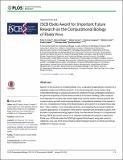ISCB Ebola Award for Important Future Research on the Computational Biology of Ebola Virus
Author(s)
Karp, Peter D.; Berger, Bonnie; Kovats, Diane; Lengauer, Thomas; Linial, Michal; Sabeti, Pardis; Hide, Winston; Rost, Burkhard; ... Show more Show less
Downloadkarp-2015-ISCB Ebola.pdf (114.0Kb)
PUBLISHER_CC
Publisher with Creative Commons License
Creative Commons Attribution
Terms of use
Metadata
Show full item recordAbstract
Speed is of the essence in combating Ebola; thus, computational approaches should form a significant component of Ebola research. As for the development of any modern drug, computational biology is uniquely positioned to contribute through comparative analysis of the genome sequences of Ebola strains as well as 3-D protein modeling. Other computational approaches to Ebola may include large-scale docking studies of Ebola proteins with human proteins and with small-molecule libraries, computational modeling of the spread of the virus, computational mining of the Ebola literature, and creation of a curated Ebola database. Taken together, such computational efforts could significantly accelerate traditional scientific approaches. In recognition of the need for important and immediate solutions from the field of computational biology against Ebola, the International Society for Computational Biology (ISCB) announces a prize for an important computational advance in fighting the Ebola virus. ISCB will confer the ISCB Fight against Ebola Award, along with a prize of US$2,000, at its July 2016 annual meeting (ISCB Intelligent Systems for Molecular Biology [ISMB] 2016, Orlando, Florida).
Date issued
2015-01Department
Massachusetts Institute of Technology. Department of MathematicsJournal
PLOS Computational Biology
Publisher
Public Library of Science
Citation
Karp, Peter D., Bonnie Berger, Diane Kovats, Thomas Lengauer, Michal Linial, Pardis Sabeti, Winston Hide, and Burkhard Rost. “ISCB Ebola Award for Important Future Research on the Computational Biology of Ebola Virus.” PLoS Comput Biol 11, no. 1 (January 29, 2015): e1004087.
Version: Final published version
ISSN
1553-7358
1553-734X